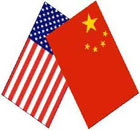Foreign and Military Affairs
Pakistan's first China think tank promotes bilateral ties
(Xinhua)
Updated: 2010-01-06 16:50
 |
Large Medium Small |
ISLAMABAD: The first think tank on China in Pakistan has made efforts and will do more to promote the bilateral relations between Pakistan and China, said the head of the think tank.
In an exclusive interview with Xinhua on Tuesday, Chairman of the Pakistan-China Institute Mushahid Hussain said a Pakistan- China friendship caravan consisting of 60 people will leave for China in June.
Hussain, also former Information Minister, said that he will lead the caravan from Gilgit area of Pakistan to China's Kashghar by road to attend the Kashghar Trade Fair to be commencing on June 25 and also to promote economic relations and cultural ties between the two countries.
"I would lead the friendship delegation, consisting of businessmen, media men, think tank scholars, experts and cultural specialists, via the Silk Route to China. By traveling via the Silk Route we want to revive the traditional route and highlight its importance as well," he said.
|
||||
About the recent steps the think tank has taken for promoting Pakistan-China relations, he said the Pakistan-China Institute has decided recently to launch the Pakistan-China friendship caravan, to establish a Pakistan-China scholar forum consisting of scholars from both sides, and to launch Pakistan-China research data base.
Hussain said it also decided to link up some Pakistani companies for the biggest Shanghai Expo running from May to October in the Chinese metropolis.
The think tank have engaged different coordinator and assigned duties to them in Karachi, Lahore and Gilgit-Baltistan in various fields like culture, tourism, education and other areas and activities with Pakistan-China friendship forum were also coordinated, he said.
Referring to the current energy crisis in Pakistan, the think tank chief said Pakistan can invite Chinese companies to carry out geological surveys for coal mines, to prepare feasibility report and to dig for coal.
He cited his experience in Urumqi, Xinjiang, where China has developed a very sophisticated technology in wind power and solar power and suggested Pakistan learn from it. He said that China is a leader in cheaper sources of energy.
On China's role in South Asia and the role of Pakistan-China Institute, Hussain said that the joint statement issued by Chinese President Hu Jintao and U.S. President Barack Obama in Beijing last November is very positive as it seeks peace, stability and security in South Asia.
Hussain praised China's positive role in South Asia, its commitment to peace and its policy of non-intervention in internal affairs of any other states, saying "China is the holder of universal principle, so we welcome China's role for peace."
To promote cooperation for the peace in the region, he said, the Pakistan-China Institute has a plan to organize a seminar in the third week of January in Islamabad, and to invite Chinese scholars for another seminar in June.
He termed China's investment in Pakistan as unique, saying that the investment has been long-term and strategic. He said it has helped the people of Pakistan in different areas, and it contributed to transfer of technology but there have never been conditions attached whether it's the heavy industrial complex in Taxila, near Islamabad, Gwadar port, a newly-built port in the south, or Zong mobile.
The Pakistan-China Institute is the first non-governmental, non-party and non-political organization with equal number of experts, scholars and intellectuals from China and Pakistan. It is the first Pakistan-based think tank to promote, strengthen and expand Pakistan-China relations in different fields.










